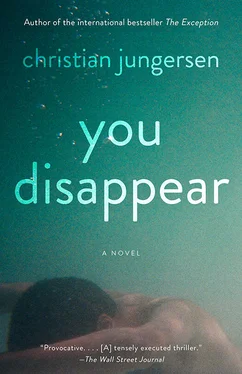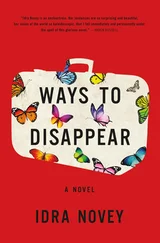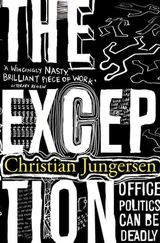I try to make him understand what Laust, Morten, and Benny said.
“It wasn’t me.” He sighs.
“No, I know that.” I sit down again on the edge of the bed next to his head; his eyes are still closed.
“It’s all your doing.” He groans.
“What?”
“The two of you.”
“Who?”
“You and Niklas.”
“How could we have done anything?”
“You said I couldn’t use the computers. So the school lost the money.”
“What the hell are you talking about?”
“You installed passwords on the computers.”
I thought that our drive through the Majorcan mountains had been the major turning point in my life. The day everything disappeared. But I was wrong.
I don’t yet know what happened, but I have a premonition that today’ll be the day Frederik’s exposed as the headmaster who destroyed Saxtorph Private School. The day we lose the friends who’ve supported us. The day we lose our house and jobs. Everything. Today.
He wakes up enough that I can get him to sit up in bed. And slowly he tells me what I tentatively have to accept as true.
Frederik secretly borrowed money from the school’s accounts to gamble on international commodity indexes. Of course he was going to repay it, but then he lost a few hundred thousand crowns when copper slumped and coffee spiked. He took more money so that he could recoup the school’s losses. He set up three private firms to siphon the money away from the school in a series of obscure transactions, falsifying documents and sureties and signatures. He lost even more money. And it just grew worse.
“I would have gotten everything back again and earned millions, both for us and the school. There’s no question. It’s only because Laust shut me out. It’s only because you installed passwords on the computers. It’s your fault.”
There’s no way the real Frederik could have embezzled from Saxtorph; it goes against everything he stands for. The tumor had been growing slowly, which the doctors say is normal. Already a year ago it must’ve been changing his personality. Before it occurred to anyone that he’d become somebody else — and that’s normal too, the doctors say.
Laust is still awake when I call.
I apologize, as emphatically as I apologized to Niklas when my stomach was pumped out. More than I apologized any other time ever. I start crying for the school and hope he will cry with me. But he’s silent.
“I’m your friend, Laust! I knew nothing! Nothing! We must be able to find some of the money in his accounts, maybe coffee prices have fallen since then — or copper gone up — whatever it needs to be. There has to be something! Some way or another. I’ll do anything I can to help you.”
Laust continues to say nothing.
“I really understand if you’re angry with him,” I say. “I get angry with him a lot too. And then I forget that it’s the illness. That’s what it must’ve been back then too. It’s the illness and not Frederik himself that dictates how he acts.”
Still saying nothing, Laust hangs up the phone.
I’m lying on the air mattress at the foot of our bed. The streetlight through the trees casts a glowing pattern on the bedroom ceiling. The tree branches vibrate and the pattern comes to life: the sign’s the same as the one in the embers on the front lawn.
Thus are we branded everywhere; thus will healthy people walking down the street know not to stop. Here live the sick people. Enter a house marked with this sign, and you renounce all claim to protection and safety. Expect no help if the poor devils savage you and tear you to pieces.
Before I lay down, I decided I wouldn’t wake Niklas, but after I stare at the sign on the ceiling for a couple of hours, I realize I was wrong: his future’s at stake. Will his father go to jail? Will we have to sell the only house he’s known? Will the papers call his father a swindler?
I pull on a pair of sweatpants. I knock on his door but he doesn’t wake up. I go in and sit on the edge of the bed, whisper his name.
“Niklas. Niklas .”
He sits up with a start, and I touch his arm.
“Nothing’s happened, Niklas. Easy now, quiet; nothing’s happened.”
This is the worst part: telling Niklas. Because now I have to say it.
“Or actually something has, Niklas. Something has happened.”
His pale face; the streetlight’s glowing sign on his cheek.
“It’s Dad,” I say.
“What? Is he dead?”
“No, he’s … they say at the school that he …” And I tell him what I know.
“I don’t believe it!” he exclaims, with the same conviction I had. He lets himself fall back on the bed.
“I didn’t believe it either,” I say.
It takes but an instant for all the thoughts I have when I talk with him to run through my head: Niklas as an old man, grey-haired and distinguished, perhaps a headmaster, perhaps minister of education, in a suit; Niklas as a baby on the changing table, peeing up in the air with his tiny penis, so I have to dry him and table both; Niklas running around in the yard playing with a wheelbarrow; Niklas’s photos on exhibit in the gymnasium library and us so proud.
“But Dad’s confessed,” I continue. “And they think I’m involved too.”
“Confessed? You?” He sits up again.
They aren’t so much thoughts as glimpses, and not individual glimpses so much as a state of mind: he falls on his bike, scrapes his smooth little knees; he plays in the sand on the beach.
“Yes. So the police will probably question us tomorrow,” I say.
“Yeah but of course you guys haven’t … of course you haven’t—”
“ I haven’t done anything. And Dad only did it because he was sick. The police will understand that, and so will Laust, when he’s no longer so angry.”
The air in here is warm and pungent — and the room’s a terrible mess, something I’ve stopped commenting on. In the darkness, I see something catch the light in his pile of dirty clothes; from here it looks like a bra. A white, almost luminous bra among the worn jeans and shirts. I can’t go any closer to be sure.
“You have to stop now, damn it!” he shouts. “Don’t you two ever think of me? You keep doing one crazy thing after the other!”
I must accept his anger, I tell myself. I have to give his emotions room.
“Of course I think of you. All the time. And I’ll do anything. You just have to—”
“You don’t think of me at all, and that’s the truth! Both of you have gone totally whack!”
Room for his anger. It’s a state of mind: he’s overnighting at a friend’s for the first time, but at midnight the parents call, they say he’s crying, and I drive over to get him. His first year of gymnasium, and two girls and a boy from his new homeroom wait for him out on the street, they’re going to the beach with mats and a cooler bag.
“Niklas, you know it isn’t me who embezzled from anyone. I haven’t done anything.”
“But you’re the one I can never trust!”
I tell myself that it’s important not to yell. I answer him calmly.
“You can trust me now, Niklas. Now.”
“The hell I could! You’re the one who should have been watching out! You! That’s what you should have done!”
I don’t say Watch out for what? I say, “I can understand this is hard for you, Niklas.”
“Shut the fuck up! You don’t hear one single …” He shouts, “Get out!”
And that, finally, is what I do.
Alone in the kitchen, I feel good about letting him give his emotions free rein. I can take it. A glimpse, a state, his little hand in mine as I walk him home from first grade.
Maybe I’ll be able to get a little sleep tonight if I eat something heavy. The best thing now would be some cold oatmeal with skim milk and banana. I look down into my meal. The color of ghosts, I think, of something unreal: semen.
Читать дальше



![Ally Carter - [Gallagher Girls 01] I'd Tell You I Love You But Then I'd Have to Kill You](/books/262179/ally-carter-gallagher-girls-01-i-d-tell-you-i-lo-thumb.webp)








